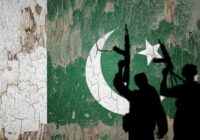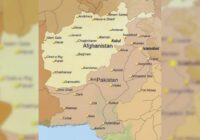Ever since a “monster” was unleashed in the 1970s, terrorism and sectarianism have been a regular occurrence in Pakistan.
Growing up in Lahore in the 1960s and 1970s, there were hardly any organized attacks on public institutions as we now see in present-day Pakistan. Sure, we heard about the atrocities committed by both sides in the India-Pakistan partition of 1947; we were informed of the occasional political assassinations (Liaquat Ali Khan); we learned about the military crackdown on the anti-Ahmadiyya riots of 1953; we actively participated in student demonstrations against the dictatorial regime of Ayub Khan; and we expressed collective disgust at the flip-flop shenanigans in the era of the senior Bhutto.
By and large, however, Lahore was a lively place embodying religious harmony and rule of law—though the British always denied “access to justice.” There was a Christian chief justice of the Supreme Court. Ahmadis held high positions in the bureaucracy. Atheist poets and thinkers congregated at smoke-filled cafes. Missionary schools abounded. And the horse-driven carriages had to be registered with the municipality.
Further, the Pakistan People’s Party, founded in 1967 by former members of the long-defunct Communist Party, had presented a counter-narrative to the notion that sovereignty belongs to God when it explicitly stated in its manifesto: “Islam is our religion, socialism is our economy, and democracy our polity; all power belongs to the people.”
Come the end of the 1970s, things changed in Pakistan’s political landscape.
Monster Unleashed
I vividly recall listening to the radio address by General Muhammad Zia-ul-Haq the night of the military coup on July 5, 1977, that “the salvation of Pakistan lies in Islam.”
This did not turn out to be an innocuously pious statement, but the harbinger of partisan politics, rise of intolerance, and an overnight shift in favor of fervent Sunni fundamentalism—pervasive among the to-be-sponsored jihadis fighting in Afghanistan; to recruits in public service especially the custodians of law and order, including the military; and brainwashed students coming from madrasas and spreading across the educational institutions.
Once the vociferous monster was unleashed, there was no turning back.
Money began pouring in from Saudi Arabia and the Gulf countries, which felt threatened by the overthrow of the shah monarchy in the Iranian Revolution of 1979.
As a result, Pakistan was transformed into a Saudi replica of fundamentalist-oriented decrees and ordinances (public floggings and stricter blasphemy laws); connotations and salutations (common use of Allah hafiz instead of khuda hafiz); and code of public moral behavior (hadood laws and the head-covered TV anchorwomen). Even the Pakistani passport carried an Arabic translation in its title.
Spreading the wings of victory, only three countries recognized the Taliban rule of Afghanistan (1996-2001): Pakistan, the United Arab Emirates and Saudi Arabia. The foreign-financed domestic version of the Taliban grouped themselves into Lashkar-e-Changi (Jet), Tarik-Taliban-Pakistan (TTP) and the Sipah-Sahaba of Islam (SSI), among various shades of “freedom-fighters” planning to liberate Chechnya, Bosnia and Herzegovina, and Kashmir.
Challenging the writ of the state was to become the norm—from the illegal construction of the Lal Masjid in Islamabad to vicious attacks on the visiting Sri Lankan cricket team in Lahore to the break-ins of police training academies.
In many ways, 9/11 and the ensuing Global War on Terror became a bonanza in Pakistan for vested interests ranging from security officials and talk-show politicos to the liberal elite engaging in doublespeak against and condemning the Western occupation of Iraq and Afghanistan.
Consequently, hate speech, abuse of public fora and media by the clergy, and the display of official lethargy in public mourning were to culminate in the blatant murder of a former Punjab governor. The culprit is still awaiting his death sentence while being hailed as a ghazi (war hero) by the unofficial establishment.
Let this be a test case for Pakistan’s seriousness on the War on Terror and the maintenance of order. Until then, Pakistan will continue with a spate of mass and innocent killings as seen at the Army Public School in 2014 and now at the Bacha Khan University in 2016.
The views expressed in this article are the author’s own and do not necessarily reflect Fair Observer’s editorial policy.
Photo Credit: Asianet-Pakistan / Shutterstock.com
 We bring you perspectives from around the world. Help us to inform and educate. Your donation is tax-deductible. Join over 400 people to become a donor or you could choose to be a sponsor.
We bring you perspectives from around the world. Help us to inform and educate. Your donation is tax-deductible. Join over 400 people to become a donor or you could choose to be a sponsor.
Support Fair Observer
We rely on your support for our independence, diversity and quality.
For more than 10 years, Fair Observer has been free, fair and independent. No billionaire owns us, no advertisers control us. We are a reader-supported nonprofit. Unlike many other publications, we keep our content free for readers regardless of where they live or whether they can afford to pay. We have no paywalls and no ads.
In the post-truth era of fake news, echo chambers and filter bubbles, we publish a plurality of perspectives from around the world. Anyone can publish with us, but everyone goes through a rigorous editorial process. So, you get fact-checked, well-reasoned content instead of noise.
We publish 3,000+ voices from 90+ countries. We also conduct education and training programs
on subjects ranging from digital media and journalism to writing and critical thinking. This
doesn’t come cheap. Servers, editors, trainers and web developers cost
money.
Please consider supporting us on a regular basis as a recurring donor or a
sustaining member.
Will you support FO’s journalism?
We rely on your support for our independence, diversity and quality.








Commenting Guidelines
Please read our commenting guidelines before commenting.
1. Be Respectful: Please be polite to the author. Avoid hostility. The whole point of Fair Observer is openness to different perspectives from perspectives from around the world.
2. Comment Thoughtfully: Please be relevant and constructive. We do not allow personal attacks, disinformation or trolling. We will remove hate speech or incitement.
3. Contribute Usefully: Add something of value — a point of view, an argument, a personal experience or a relevant link if you are citing statistics and key facts.
Please agree to the guidelines before proceeding.